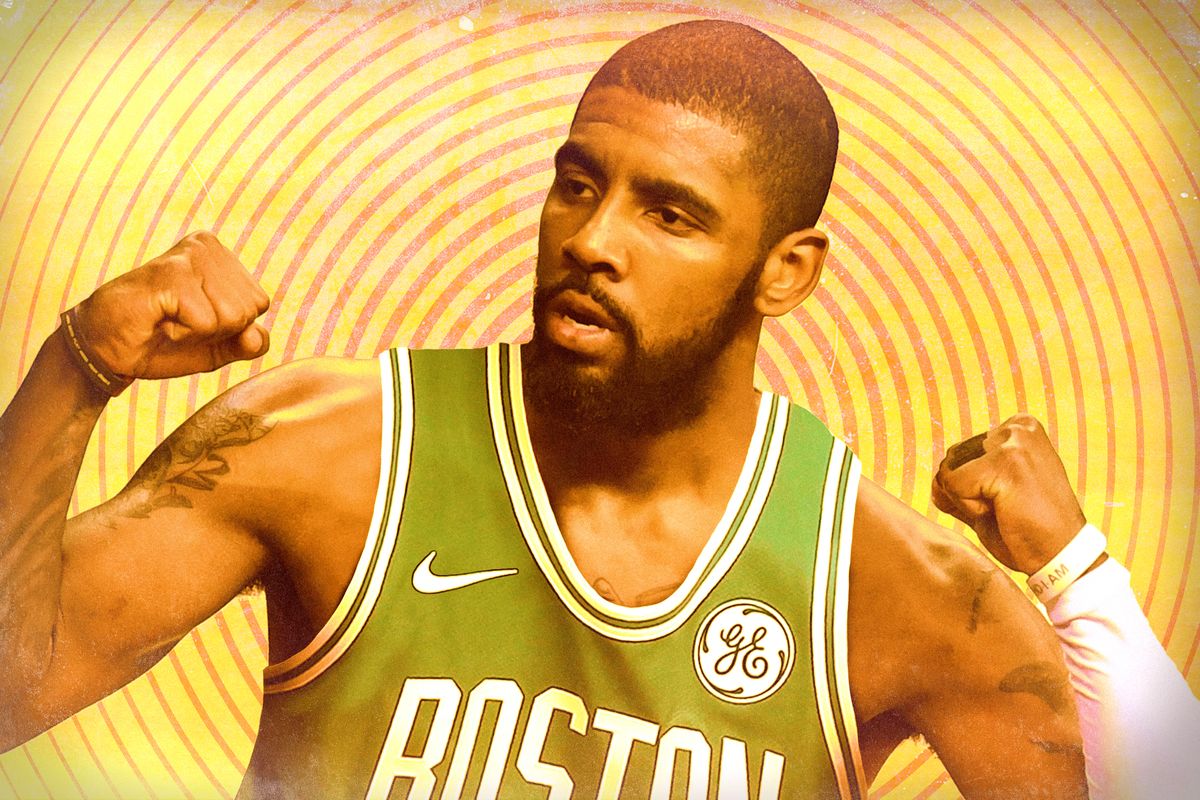It’s been a wild 24 hours for the Celtics, after an off season that has already give Celtics fans a some cause to order that celebratory drink. In fact, we just posted “Way-to0-early predictions” and you can’t help but ask if this team adds a few more Ws to our Celtics’ cause.
Chris and I found ourselves debating the merits of IT, the trade and their histories and decided to take it public so you can weigh in. But, before we get started, let’s say a collective THANK YOU to Isaiah Thomas. He brought it for the fans and his teammates every night. The things he did off the court, like recruiting other players to our cause, had a significant impact on this team. So, thank you Isaiah. But, this is a business, so let’s talk…
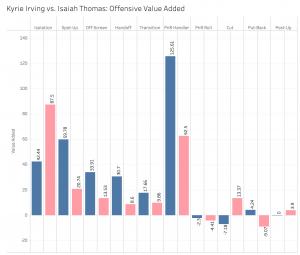
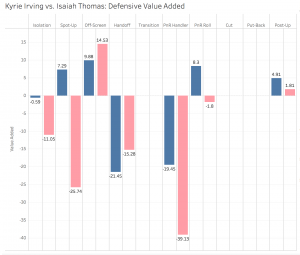
Chris: There are probably a lot of people with negative emotional reactions to this trade. However, this won’t be your typical “heart says no, head says yes” argument. In my opinion, this is an objectively bad trade from a value standpoint. Kyrie Irving and Isaiah Thomas are very similar players. They’re both great PGs. But Isaiah Thomas fit the system perfectly. Excellent pick and roll player, great at attacking the rim or pulling up and shooting from range. Excellent getting to the line, and one of the very best free throw shooters in the NBA. While Kyrie is also undeniably a great player, paying Jae Crowder, Ante Zizic and the BKN ’18 pick to swap Thomas for a younger, less seamlessly fitting, version of himself seems like a massive overpay.
The trade by the numbers
First, play-type data from nbamath.com shows Thomas as the massively superior player both offensively and defensively last season. (And far superior in the pick and roll offensively, a bread-and-butter play for the Cs.) And this isn’t a volume stat. This isn’t a “well he ran more PnR so of course he accumulated more points in this type of situation. We’re talking points per possession, an efficiency stat that volume usually drags down. Thomas was a top 10 NBA player in Win Shares. He was top six in Win Shares Per 48. He scored 29 points per game as the sole focal point of the defense, attracting numerous double and triple teams and baseline and half-court traps. Thomas could get to the free throw line as well as anyone not named James Harden, and he was the second-best free throw shooter by percentage in
the NBA last season.
Brett: I’m not going to lie, I had an emotional reaction to this trade. I think ITs commitment to the fan base is irreplaceable. From all accounts, he was a great teammate, has a strong work ethic and is an all around good guy. Kyrie got some of those qualities, but (and maybe it is because I don’t live in Cleveland) – I didn’t see as much of that. That said, bringing a guy who can create his own shot and needs less help in post defense. Sure, neither are great defensive players but Kyrie hasn’t had a coach like Stevens and can learn a new system, IT can’t grow.
I have a different perspective on the win shares. Did he score, yes. Did the team have anyone else who could come close to that, no. Lebron (according to ESPN) averaged about 33 points again, Kyrie 26 and Love 17. The top three Celtics players had Thomas at 23, Bradley with 17 and Horford at 15 for the 2016 season. Boston needed to run plays, to provide Thomas room to find his shot. Even competing for his shots in Cleveland with higher performing players around him, Kyrie was a top 20 ppg guy.
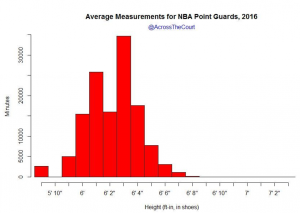
The algorithms of basketball
Chris: Kyrie is also a great player. However, Kyrie Irving is a less efficient scorer. Sometimes this isn’t necessarily his fault, he excels at less efficient play types like isolation sets out of the high post. But the fact remains. This is especially concerning as Kyrie was playing with the greatest basketball player on earth and for a great three-point shooting team featuring the likes of Kevin Love, J.R. Smith and Channing Frye. Usually playing alongside other super-stars has statistical side effects. It may temper your counting stats, as you won’t see the ball as much or get as many shots. However, it usually increases efficiency. Celtics fans saw this effect first-hand when Pierce, Garnett, and Allen joined together. The all experienced drops in raw production of counting stats, but the best efficiency of their careers.
Kyrie is also not an improvement defensively. Again, turning to nbamath.com, one can see that Kyrie was a massive negative in several play-types. While Isaiah Thomas was also a negative defender, his negative impact on that side of the ball has been far overstated. Kyrie was actually far worse.
Brett: Ok, Chris, I hear you, and according to nbamath.com almost 20% of Isaiahs shots in the last two years came off screens or hand offs where Kyrie needed that help half as often. In fact, Kyrie was able to play isolation more than twice as often as the It. I supposed someone could argue thats that nature of these two teams systems. but for Kyrie to spend 20% of his team in isolation with guys like LeBron and Love on the team is undeniable. So, Isaiah needs his teammates to put extra miles on their legs to get him open where Kyrie can create his own shot. Two sides of the same coin? Maybe, but Kyrie’s value added in isolation is twice as strong as IT.

Celtics sacrifice?
Then there is the value side of what the Celtics gave up. The BKN pick was a prime asset. The 2018 draft class appears to be excellent. Zizic had very promising overseas numbers. Guys like Porzingis, Jokic, and Nurkic played comparably during their overseas careers. Zizic may not pan out like them, and isn’t a three-point shooting or offensively skilled unicorn like Porzingis, but he is a nice prospect. And Jae Crowder was included in the trade as well.
The thought of the Cavs lining up Isaiah Thomas, J.R. Smith, LeBron James, Jae Crowder at the four, and either Tristan Thompson or Kevin Love at the five looks terrifying. Crowder can defend the three’s and four’s of the modern NBA and hit spot-up and catch and shoot threes at a 40% rate. Crowder represents one of the best value contracts in the league. All this for a player who will cost roughly $14M dollars more than Isaiah Thomas this season, and has an opt-out after two years. For all the whining about paying Isaiah Thomas max money, Thomas was still on the books for a bargain price this year, and Kyrie will need the exact same max to stick around just a year later.
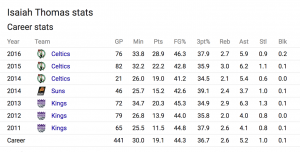
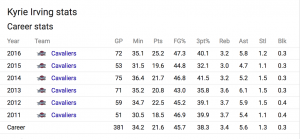
This trade stands as a massive gamble and still possibly a massive overplay. The Celtics have to hope they can integrate Kyrie in their system. They’ll need to transform him from an isolation player to a read-and-react offense, pick-and-roll heavy type system fit. They have to work on his shot selection. They have to hope Kyrie can duplicate the success Thomas had last year.
Even if you believe Kyrie has superior talent, which doesn’t necessarily showing up in the objective evidence, this won’t be a slam dunk because Isaiah was such a great system fit. The Celtics also have to hope Kyrie re-signs with the team in two years. If he walks, it’s a terrible trade.
The Celtics also have gambled on IT and LBJ leaving CLE in a year. If they both leave, and Kyrie works out, they’ll look like geniuses. If LBJ, IT, Love, TT, and Jae all excel together and decide to stick around, it may not matter how well Kyrie integrates into our system. So not only is this trade a risk in the short-term, but the best long-term asset in the trade went to CLE. And that is the BKN pick. In three years if Kyrie Irving is playing elsewhere and the Cavaliers have a young lottery stud to groom, this will be a terrible trade.
Consider the upside
There is potential for this trade to work. Kyrie could excel in the Celtics system like Isaiah did. Kyrie came from an ISO-centric system in college. Perhaps coming to a motion heavy, PnR-heavy, read-and-react offense will be a breath of fresh air. He’s a great ball handler, finisher and shooter. He could re-sign with the team. He is younger than Isaiah. (Though the two have very similar mileage in terms of NCAA+NBA combined minutes. Thomas was a four-year college player, and didn’t jump up to an 82 game grind as early as Kyrie did.) The Celtics now have two years to make a max contract decision on their star PG instead of one. While Isaiah Thomas has been the far more durable player in their careers to date, and the hip is probably being over-stated as a concern, Kyrie is healthier right now and will be to start the season. The Celtics may have had to deal with a slight delay with Thomas. That’s probably not a big issue long term, but now they should start the season fully healthy as a team, which is always nice.
